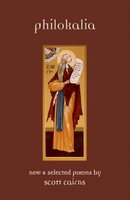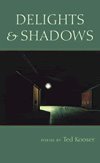
One of the reasons I wanted read Philokalia is that the author, Scott Cairns, is a former professor of mine. I took his Creative Writing seminar one summer in grad school. I think I learned a great deal from his workshops, and since his book The Translation of Babel was published that year, I also read his poems. In my copy of this book he wrote: "With great hopes for your own poetic project. Let John Donne and his Lord be your muses." He knew how much I liked and were inspired by poets like Donne, Eliot, Herbert, Hopkins, and the like, but I didn't know how much the traditions of these poets meant to him, even after reading this book and The Theology of Doubt. With Philokalia, much comes clear.
Philokalia (2002) collects poems from the above mentioned volumes, Figures for the Ghost, Recovered Body and some "new" pieces. I very much enjoyed re-reading the poems from the other collections as well as those I was encountering for the first time. On the Zoo Press website, one finds (in addition to a nice selection of poems from the book) the following: "As Larkin was perhaps the only true atheist poet of the 20th century, Cairns may be the only true spiritual poet of the 21st." I'm not sure the latter is quite true, but I have yet to encounter a living poet who writes so adeptly of the sacramental vision of the world. These verses will not appeal to everyone who calls him/herself a Christian, but they should. Cairns' Christianity is bolder and more realistic than some have taste for, but it is also more grounded and heartfelt without being sentimental. Some of these poems smacked me hard at the same time they edified. For example, consider the ending "Possible Answers to Prayer":
Your answers, your zeal, your lipsmackingly
righteous indignation toward the many
whose habits and sympathies offend you --
these must burn away before you'll apprehend
how near I am, with what fervor I adore
precisely these, the several who rouse your passion.
Edify means "to build up or increase in faith, morality, etc." (Random House College Dictionary). It does not mean "make you feel better about yourself." Cairns' poems edify in the truest sense of this word and further.
Ted Kooser wants to bring poetry into the lives of everyday people, a difficult and laudable task. As Poet Laureate, he travels the country reading and discussing the subject. He writes a column, "American Life in Poetry," which is distributed free. In an interview with Writer's Digest, he advises "budding poets": "Get a regular job that will pay the bills." One gets the impression from his work that he has worked what my father might call "a real job." (Kooser did work in the insurance business.) Another way he is able to bring poetry to the masses is that he writes accessible, beautiful poems about everyday life that, if we stopped long enough to look at it, is far from boring.
Delights and Shadows (2004) won the Pulitzer Prize, and while it is not the most striking collection I have read of those who have earned the acclaim that comes with this award, it is well worth the reading. Kooser reminds me of a cross between Robert Frost and Raymond Carver. I'm sure that comparisons to first, an American icon, will get me a few angry emails. And the people at Norton do not even seem to know that Carver wrote poetry. But consider that both wrote deceptively simple poems charged with the electricity of common existence, and you will see what I mean. Kooser isn't as good as Frost (Frost did write a few stinkers one should note.) at capturing the inner life as it is mirrored in the outer world, but he is very good. For example, look at these last lines from "Old Cemetery":
The dead must have been overjoyed

to have the world back to themselves,
to hear the creak of trailer springs
under the weight of the cooling mower
and to hear the pickup turn over and over
and start at last, and drive away,
and then to hear the soft ticking of weeds
springing back, undeterred, in the lane
that leads nowhere the dead want to go.
Like Carver, Kooser's poetry is economical. He told Writer's Digest that he "revises a poem of say, 20 lines, perhaps 30 or 40 times." That practice shows in these usually short, packed verses. Few are longer than a page, and many may seem to be mere pictures or vignettes, but are really snapshots that strum the strings of our own associations and difficulties. Further, these poems do address feeling, but not feelings. That is, they touch on what is deep in ourselves, what moves us, not the "getting out" of emotion. A nice example is the final poem of the collection, "A Happy Birthday," where the speaker celebrates the last still moments of the day: "I sat by an open window/and read till the light was gone and the book/was no more than a part of the darkness."
Here's hoping that our days end so peacefully. Reading Delights and Shadows may be just book for such evenings.
C. K. Williams' The Singing was perhaps the most challenging of the three volumes I read in the past month, but that is because I was rather tired and stressed when I first read the book. I found myself re-reading passages, not because they were difficult, but because I knew they deserved my full attention.

As in Repair (my personal favorite of his books), one finds the long, rhythmic lines that sing the reader into a state of near contemplation. But there are also shorter, lyric-like lines that are equally as effective. Williams a master of the well crafted line and stanza. Also, many of these poems are personal without being confessional or maudlin. I was particularly taken by those pieces where the speaker of the poem has encounters with strangers and looks inward as in the title poem and "Lessons." There are also poems about the encounters Williams has had with other poets and artists, such as "Oh" and "Elegy for an Artist."
I can only stomach sequences from someone as crafted and skilled as Williams, and here he does not disappoint. I found myself particular moved by the "Of Childhood the Dark" as well as "War," "Fear," and "The Hearth." In these pieces, as with the rest of the book, our hearts are challenged and made a little freer.
So what am I doing for National Poetry Month? Well, I will continue a tradition I started a few years ago by reading a poem each day to begin each class. No analysis. No "literary" discussion. Just experiencing the poem. Also, I have been asked to read one of my own poems for a program at Eastfield. If you are looking for something to do, let me suggest visiting The Academy of American Poets or Poetry 180. Enjoy!









1 comment:
I love your thoughts on T.O. You once again have proven that you're the smartest man I've ever met. I love you Daddy ...and while I'm sad that we can't watch the Cowboys together anymore like we used to....I'm still excited about watching the Stars. I love you!!
Post a Comment